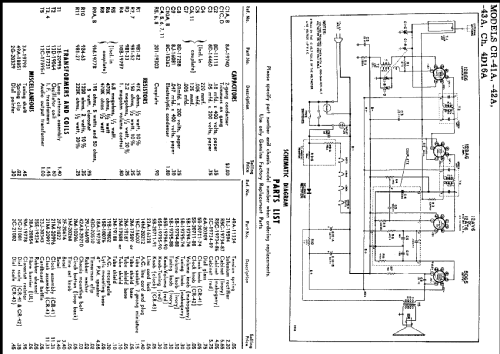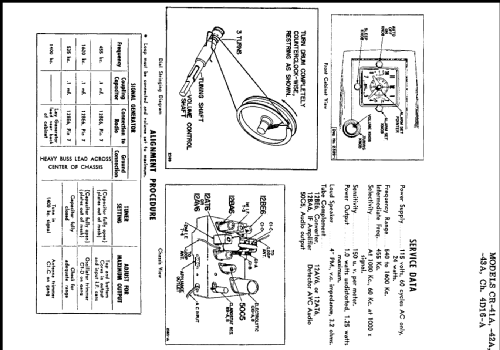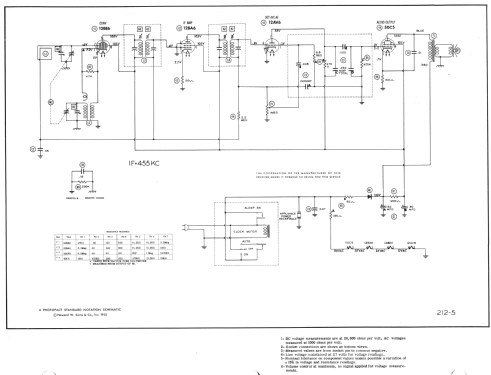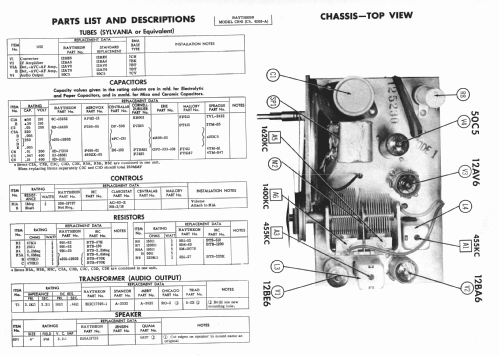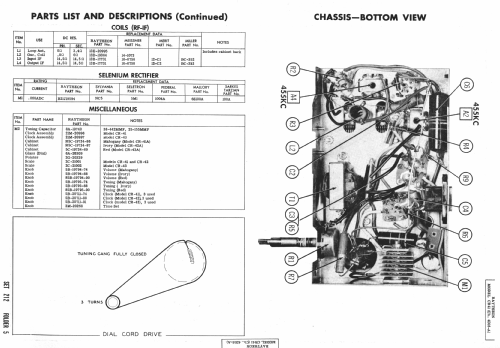CR-41A Ch= 4D16-A
Raytheon Mfg. Co.; Cambridge, MA
- Pays
- Etats-Unis
- Fabricant / Marque
- Raytheon Mfg. Co.; Cambridge, MA
- Année
- 1953

- Catégorie
- Radio - ou tuner d'après la guerre 1939-45
- Radiomuseum.org ID
- 52945
Cliquez sur la vignette du schéma pour le demander en tant que document gratuit.
- No. de tubes
- 4
- Principe général
- Super hétérodyne (en général); FI/IF 455 kHz; 2 Etage(s) BF
- Circuits accordés
- 6 Circuits MA (AM)
- Gammes d'ondes
- PO uniquement
- Tension / type courant
- Alimentation Courant Alternatif (CA) / 115 Volt
- Haut-parleur
- HP dynamique à aimant permanent + bobine mobile / Ø 4 inch = 10.2 cm
- Puissance de sortie
- 1 W (qualité inconnue)
- Matière
- Plastique moderne (pas de bakélite, ni de catalin)
- De Radiomuseum.org
- Modèle: CR-41A Ch= 4D16-A - Raytheon Mfg. Co.; Cambridge,
- Forme
- Modèle de table avec réveil ou horloge
- Remarques
-
According to SAMS Photofact 212-5 from August 1953 the chassis 4D16-A was first used for the models CR41, CR41-A (both Mahogany), CR42, CR42-A (both Ivory), CR43, CR43-A (both in Red) with the same cabinet - and for Western Auto models Truetone D2216A and D2217A. Built in loop antenna, single Selenium Rectifier. The manual of 1952 "most-often-needed radio diagrams" shows under Montgomery Ward also the Airline Clock Radios models 15BR-1548A, 15BR-1549A, 25BR-1548B and 25BR-1549B for this chassis, which are documented in Photofact 191-3 from January 1953.
Raytheon used its chassis 4D16-A tater also for three Alarm-Clock Radio models with the same cabinet in different colors: Model C-50B is in Walnut, Model C-51W is in White and Model C-52R is in Red. See also Beitman volume R-16 from 1956.
- Source du schéma
- Rider's Perpetual, Volume 23 (last), covering up to 1954
- Auteur
- Modèle crée par Peter Rutishauser. Voir les propositions de modification pour les contributeurs supplémentaires.
- D'autres Modèles
-
Vous pourrez trouver sous ce lien 324 modèles d'appareils, 152 avec des images et 240 avec des schémas.
Tous les appareils de Raytheon Mfg. Co.; Cambridge, MA
